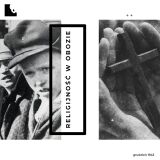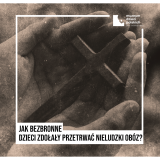back...Practicing religion in the concentration camp
The children who were sent to the concentration camp in Przemysłowa Street found themselves in a world full of cruelty that was completely different from the safety of their family homes. The child-prisoners tried to handle their difficult situation as best as they could, at all costs. How did the helpless children manage to survive in the inhuman reality of the concentration camp? One of the things they did was praying, although, as indicated in the documents discovered, religious practices sometimes served as an additional pretext for further brutal punishments.
“Before the outbreak of typhus epidemic in December 1943, during the evenings we spent in the ‘sztuba’, we recited the litany in Polish and sang “Boże, coś Polskę” (“God Save Poland”). During our prayers, Eugenia Pol rushed into the room and forced us outside in our camp underwear. First we had to stand on the snow, and then she ordered us to jump over each other,” Nella Pielaszkiewicz, a former prisoner of the Nazi German Concentration Camp for Polish Children in Łódź, recalls in her testimony.
“(...) one day after the evening roll call, when we were already in the barrack – which we called ‘sztuba’ – all of the girls started to recite a litany. We were lying on bunks together with Głowacka (Irena). We slept together to keep warm. Pol heard us; she quickly ordered us to get down from our bunks and asked who had started the prayers. She had a bullwhip in her hand that she carried with her constantly. Neither of us wanted to confess who initiated reciting and Pol said if we didn’t confess, each and every one of us would be subjected to beating. So I told her that I had started the litany. Pol started to beat me in the barrack, then she ordered us to go outside. There she made us do the burpee exercise...,” recollects Alicja Molencka, a former prisoner of the camp in Przemysłowa Street.
“(...) we prayed and agreed among ourselves that if we recited Hail Mary ten times and we did not do any mistakes, it was a sign that we would manage to get out of the camp. And we did not make any,” says the former inmate Alicja Kwaśniewska.
Kazimierz Gabrysiak added: “(...)We were constantly reciting Hail Mary in our minds and longing for home. Constant fear. We didn’t think about higher things.”


